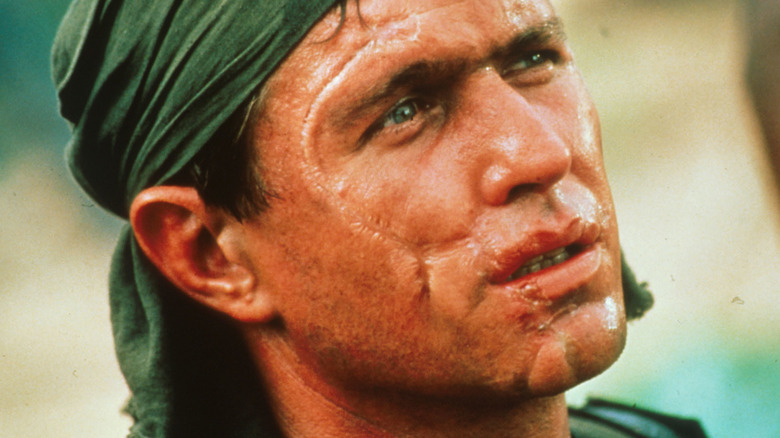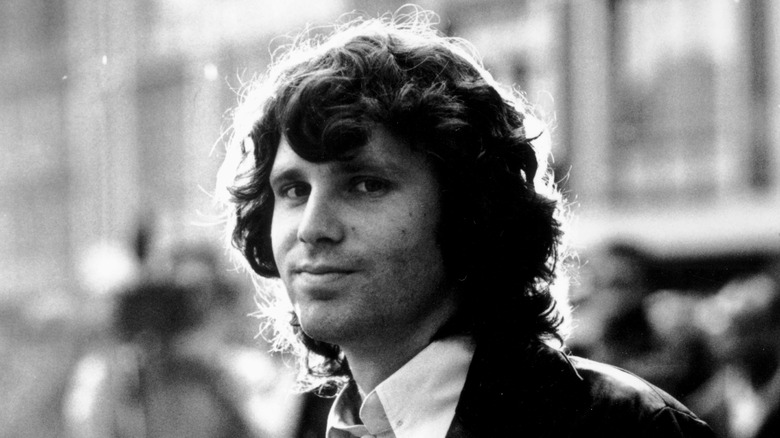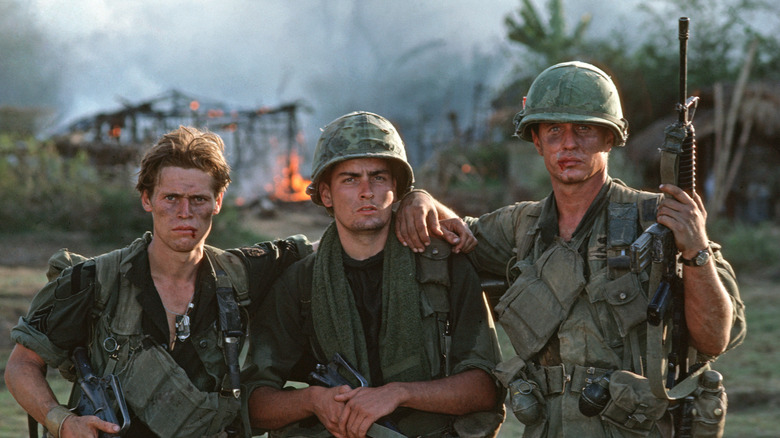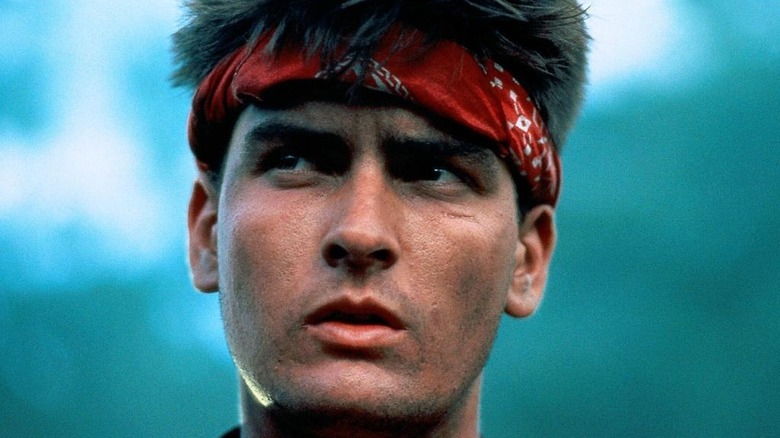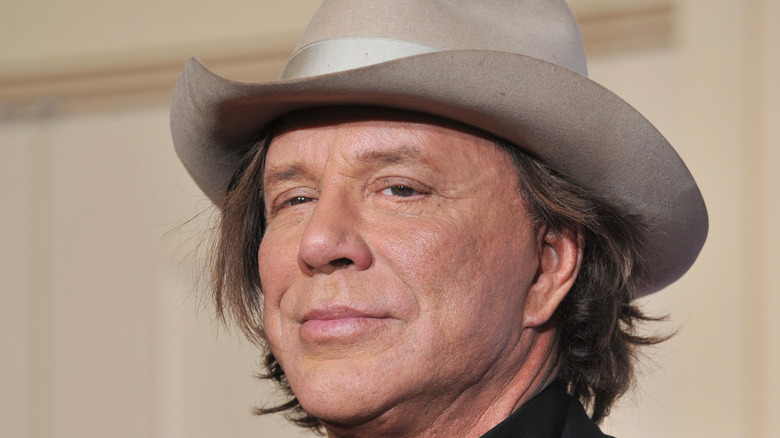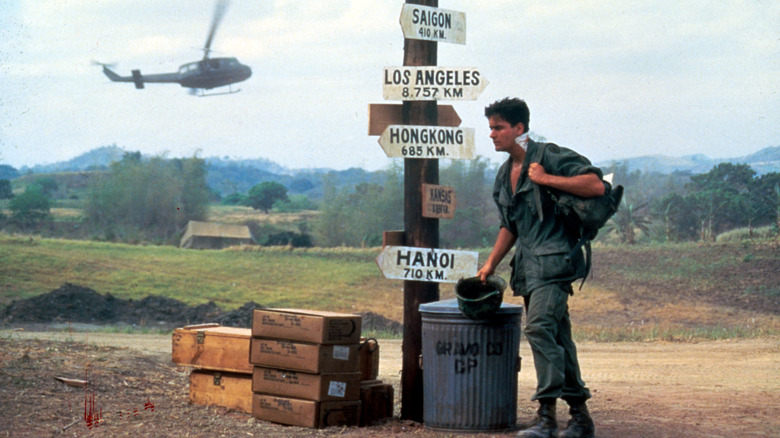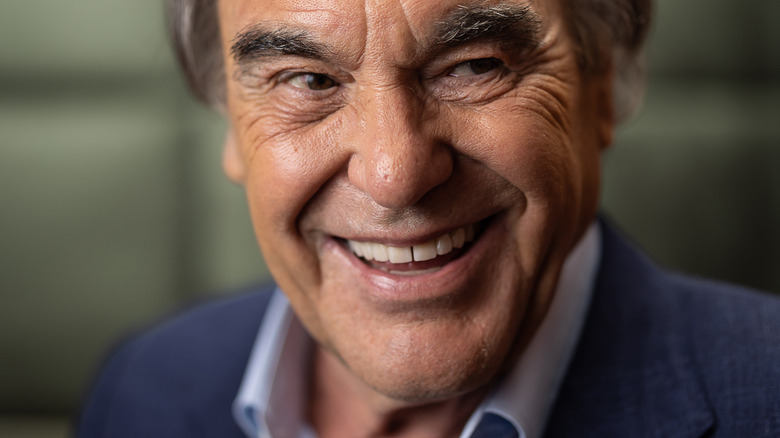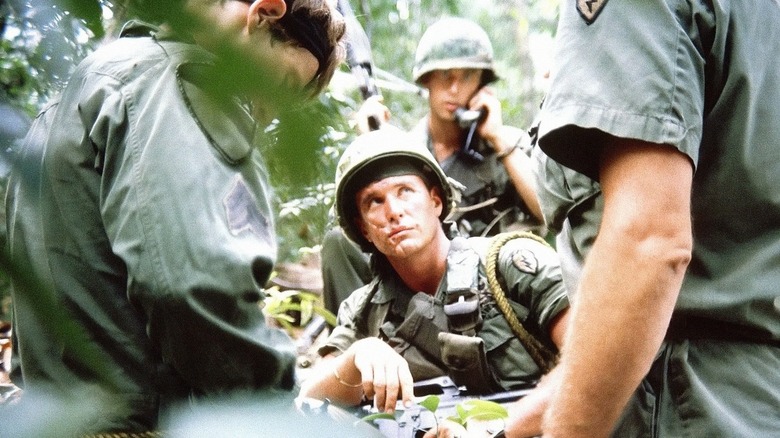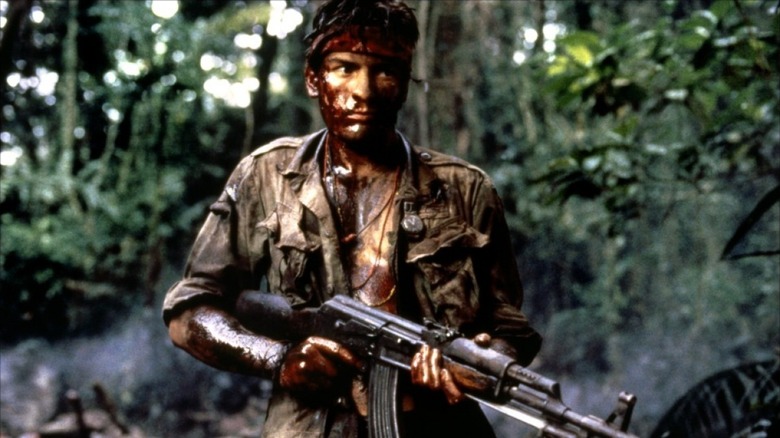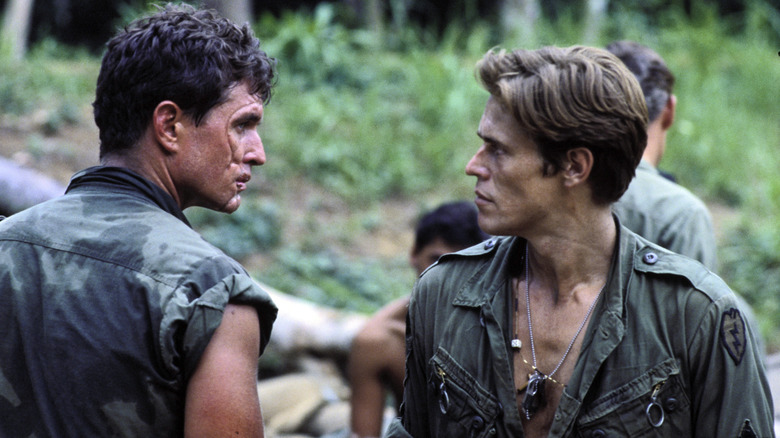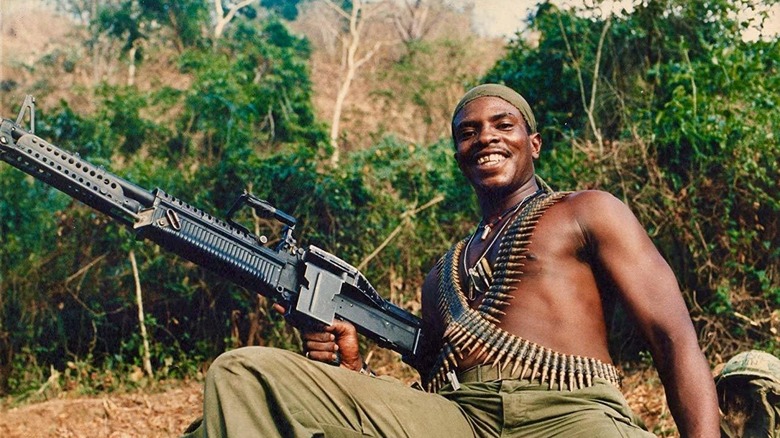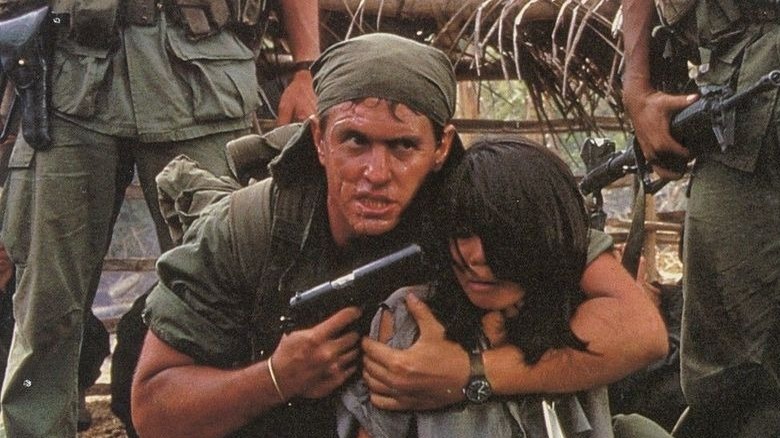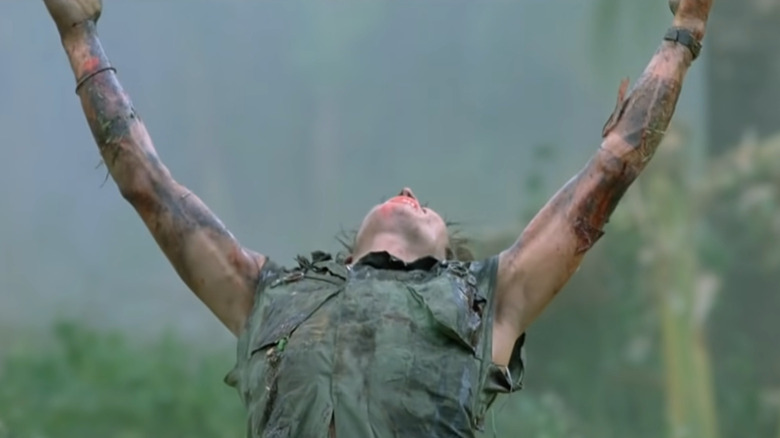Platoon Facts That Got Lost In The Jungle
Back in the 1980s, Oliver Stone introduced a new generation to the senseless horror of the Vietnam war with a movie that was a far cry from the good guys versus bad guys formula of countless war films. There are no heroes in "Platoon," just victims of circumstances trying to make sense of a hell that is the "impossibility of reason." "Platoon" is an unflinching account of what happened to millions of Americans who were shipped out to an unfamiliar country and found themselves in a hostile jungle where the only code was to kill or be killed. "Platoon" reminds the viewer that in a primal environment of fear and chaos, where death is only ever a heartbeat away, an individual's biggest fight is for the preservation of their humanity.
The 1986-released film struck a chord with audiences worldwide and would go on to win four Academy Awards. Yet its defining legacy was that it shined a light on what Vietnam veterans experienced on the ground level in a war they didn't start or comprehend, but were in many cases forced to fight and die in. As a veteran himself, Stone explained that he wanted to "make a document of a time and place" and commit to both celluloid and posterity an uncompromising account of "what it was like to be there" (via The New York Times). Nearly 40 years later it's safe to say Stone succeeded in his endeavors. Here's what you might not have known about "Platoon."
Oliver Stone wanted Doors singer Jim Morrison to play the lead in an early version of Platoon
If there's a rock band most associated with the Vietnam war, it's The Doors. Songs such as "The Universal Soldier," "Rider on the Storm," and of course, "The End" which was famously used in the opening credits to Francis Ford Coppola's "Apocalypse Now," all capture the permanent unease and chaotic darkness of a life lived in conflict. As Billy Joel sang in "Goodnight Saigon," "We passed the hash pipe and played our Doors tapes." Here's where things get a little weird. When busy filming the Jim Morrison biopic in 1990, Stone was pleasantly surprised to receive an early draft of the "Platoon" script which he had written in 1969 and sent to The Doors singer for consideration.
Stone told Entertainment Weekly that the script was found in Morrison's Paris apartment in the aftermath of his tragic death in 1971, but was not returned to Stone until nearly 20 years later when shooting "The Doors." Stone explained in keeping with the spirit of the era, the original version of "Platoon" was very mythical and involved the death of the main character and his later experiences in the underworld. "I couldn't deal with Vietnam yet in a completely realistic way at that point," he said. And I did send it to Morrison because it had a lot of Doors music in it. And he had it in the apartment in Paris when he died."
Platoon was nearly made in both 1976 and 1984
After his ambition to make "Platoon" as an art house project with Jim Morrison fell through, Stone got another bite of the cherry in both 1976 and 1984, but each time fate conspired to derail the project. In an interview with Entertainment Weekly, Stone revealed that the 1976 version of "Platoon" was a hit with "Dog Day Afternoon" director Sidney Lumet, but overall it was considered too gritty and close to the bone for audiences at the time because "no one wanted to make a realistic movie." Stone's disappointment was short-lived because he made his Hollywood breakthrough soon after with the screenplay for "Midnight Express."
However, his pet project was delivered a further blow at the end of the '70s when not one but two uncompromising movies about the Vietnam war proved a huge commercial and critical hit. Stone explained that in the wake of the one-two punch combination of "Apocalypse Now" and "The Deer Hunter" there was, "the feeling our moment had passed. So I was sad about it — really heartbroken. I forgot about the script for a while, thinking it would never get made." In 1984, "The Deer Hunter" director Michael Cimino offered to produce "Platoon" and convinced Stone to go again. However, in Stone's words, "I thought it was going to happen, but Dino DeLaurentiis f****d us over, big time." Yet perseverance has its own reward, and "Platoon" eventually saw the light of day.
Charlie Sheen only got his part after Willem Dafoe's nod of approval
As the son of the actor Martin Sheen, who played Captain Willard in "Apocalypse Now," there's a sort of poetic happenstance to Charlie Sheen playing the lead character in "Platoon." The whole film hangs on his performance as Chris Taylor — a middle-class boy who volunteers to serve amongst the grunts on the front line because his moral sensibilities consider it unfair that it's mainly blacks and poor white boys sent to fight and die in the jungle. As such, he is the everyman character the audience can relate to. Stone said of Sheen: "He was perfect for the movie. He conveys the horror of the place" (via Entertainment Weekly).
However, Sheen may never have got a chance to shine, if Willem Dafoe, who plays Sgt. Elias in "Platoon," hadn't first given him the nod of approval. In an interview with The Guardian, Sheen revealed that he only auditioned for the part because his brother, Emilio Estevez, who was originally given the role in the 1984 version, had to back out due to work commitments. At his first audition, Stone felt Sheen was "too mannered." Yet after his performance in "The Boys Next Door" and "Lucas," Stone changed his mind. He agreed to give Sheen a shot but only if Dafoe felt he was right for the part. After briefly meeting Dafoe in the Philippines, Stone broke the good news to Sheen: "Willem digs ya."
Mikey Rourke or Kevin Costner could have been Sgt. Barnes and Keanu Reeves could have played Chris Taylor
Although Charlie Sheen made the role of Chris Taylor his own, it could have been a different actor mouthing immortal lines such as, "I think now, looking back, we did not fight the enemy; we fought ourselves. And the enemy was in us. The war is over for me now, but it will always be there." In an interview with Entertainment Weekly, Stone admitted that Keanu Reeves, Kyle MacLachlan, and even Johnny Depp were considered for the part of Taylor. Reeves was the most prominent front-runner, but the future "John Wick" star "turned it down because of the violence. He didn't want to do violence."
In the same interview, Stone also revealed that Mickey Rourke and Kevin Costner were also considered for the role of Sgt. Barnes. Stone said, "Costner passed on it, I believe, because his brother had been in Vietnam." Although his recollection isn't definite, Stone also believes that Jeff Bridges was also in the running to play Sgt. Elias, but the director always had a penchant for Willem Dafoe to play the part. "I liked Willem because I'd seen him as a bad guy in 'To Live and Die in L.A.' and I liked the idea of him being a more positive character."
Special red soil was imported in to give the shoot that 'Nam vibe
Although a film with a big reputation, "Platoon" was shot on a relatively modest budget of $6 million (per The Numbers). It was filmed in 54 days in the Philippines after the government in Vietnam refused Stone the opportunity to film in their country. The authorities were concerned about how Stone would portray their army's actions during the conflict (via War History Online). Although a political revolution in the Philippines nearly derailed filming, Stone and his crew weathered the storm and made it through to the other side. Yet one of the biggest complications that filming in the Philippines wasn't civil unrest, but a question of soil.
The Philippines lacked the distinctive red soil that Vietnam was famed for, and Stone's obsessive attention to detail wouldn't allow him to overlook this small but nagging problem. The director decided to import enough of the red stuff to the Philippines to give "Platoon" that all-important authenticity. The Guardian reports that Stone liberally sprinkled enough of the red soil around the set so that even the most eagle-eyed viewer would think they were in Vietnam.
Vietnam veteran Oliver Stone used a lot of his own experiences in Platoon
Before he became a big name in Hollywood, Stone had already done a lot of living. In 1967, he joined the army and asked to be deployed to Vietnam (via Military.com). His experiences there helped shape him and would later help inform the feel and narrative of "Platoon." Serving with the 3rd Batallion, and 25th Infantry, Stone was awarded the Bronze Star after singlehandedly taking out an enemy sniper in a spider hole. Stone wrote in his 2020 memoir, "Chasing the Light," that an enemy ambush had killed his unit's lieutenant, NCO, and scout dog. Seeing red, Stone wrote, "Maybe I was just cold and angry about the dog's death or the futility of it all. All I knew was that this was my moment to act." Stone took out the sniper by rushing his position and throwing a grenade from 15 yards out.
Stone joined the 1st Cavalry Division where his unit would later suffer an all-night human-wave attack from Vietnam troops preparing for the Tet Offensive. In an interview with BBC radio, Stone explained, "The battle was amazing. The power, the force of that battle was like being in a hurricane." Stone would later write in his book, "Soldiers might say it was hell. But I saw it as divine. As close as a man could ever come to the Holy Spirit is to witness and survive this great destructive energy."
The cast was sent to boot camp to develop a full understanding of life as a grunt
When preparing to film "Platoon," Stone felt it was necessary for the cast to not just act like grunts but live like them too, so he dumped them in a jungle boot camp to give them a taste of military life. In an interview with The Guardian, Sheen said he thought they'd only be there during the night and return to the comfort of a luxury hotel at night. "At sundown on the first day, there was no bus pulling up. I looked at Johnny Depp and Forest Whitaker and said, 'I guess we're staying here,'" said Sheen. Recalling how everybody was shattered and starving, Sheen explained that Whitaker nearly cut his thumb off trying to open a coconut with a machete. "Before I could say, 'your thumb is too close!' He swings and hits his thumb dead center. It was a 'scream for the medic' moment — and that was still in training camp."
John C. McGinley who plays Sergeant O'Neill, added, "Willem drank water from a river when there was a decomposing oxen downstream and he got medivacked, Tom dropped a knife in his f***ing foot — it was just all getting terribly real. Two weeks earlier we were running around New York's West Village having coffee bagels and talking about Hamlet. Now we're in the jungle with bamboo vipers."
The Pentagon was a fan of Top Gun but not Platoon
Compared with "Platoon," "Top Gun" is a clean-cut, uncomplicated and glamorous version of life in the armed forces and reportedly led to a new generation queuing up to enlist in the Navy. In comparison, "Platoon" was a scathing indictment of the military complex and America's involvement in Vietnam. It's no wonder the Pentagon wasn't a fan of the film.
According to The Washington Post, there is an anonymous group within the Pentagon that can greenlight official cooperation and financial backing to any film producers who are making a military-based movie. The downside of this is once you sign on the dotted line, a filmmaker is in danger of losing all artistic integrity as the Pentagon can demand all manner of hoops be jumped through to meet their strict criteria.
Despite falling foul of the Pentagon's favor, "Platoon" was a huge critical and box office success. Based on his own experiences, Stone's script had the ring of truth and authenticity which hit home with audiences worldwide. Nevertheless, it was flat-out rejected by the Pentagon. In a confidential memo, Col. John E. Taylor of the Army's public affairs staff wrote, "We have reviewed the script, 'The Platoon,' and have found the army cannot support it as written. In its present form, the script presents an unfair and inaccurate view of the Army." Taylor added, "The entire script is rife with unrealistic and highly unfavorable depictions of the American soldier."
War correspondent David Halberstam called Platoon the first real Vietnam film
Upon its release, Stone's depiction of young and bewildered soldiers serving in a lawless combat zone had a huge impact on people from all walks of life. Time reports that Steven Spielberg said, "It is more than a movie; it's like being in Vietnam. 'Platoon' makes you feel you've been there and never want to go back." Brian De Palma, who directed Stone's "Scarface" script added, "Seeing 'Platoon' get through the system makes the soul feel good." However, it wasn't just those who worked in the industry and movie audiences who were unanimous in their praises. Former Senator Gary Hart enthused, "every teenager in America should see 'Platoon.'"
Chairman of the Vietnam Veterans Memorial Fund, John Wheeler, said, "'Platoon' is a new statement about Vietnam veterans. Before, we were either objects of pity or objects that had to be defused to keep us at a distance. 'Platoon' makes us real. It speaks to our generation. Those guys are us." David Halberstam was the Vietnam war correspondent for the New York Times and hails "Platoon" as "the first real Vietnam film."
Yet not all Vietnam veterans were fans of Stone's vision. Bob Duncan, who was a soldier in the 1st Infantry, felt the film played up to stereotypes. "He managed to take every cliche — the 'baby killer' and 'dope addict' — that we've lived for the past 20 years and stick them in the movie about Vietnam," said Duncan.
A critic called Platoon a slap in the face for African American veterans
In a BBC Sounds interview, Stone said that he formed closer bonds in Vietnam with Black soldiers than anyone else. Before his deployment, he admitted he had never known Black men growing up and was afraid of them. "But when I saw them there they were the most human. With them I smoked dope, I listened to music, danced, laughed." Stone explained the Black soldiers "knew they were fighting for a bull**** cause for white America" and that he connected with their understated but deeply-felt anti-war sentiment.
However, The Telegraph (via People) reports that figures such as Wallace Terry, who reported from the Vietnam front lines for Time and wrote the book, "Bloods: Black Veterans of the Vietnam War," slammed the film as "an abysmal racist disaster" and "a slap in the face for Black veterans." Terry said that although "Platoon" captures the hellish essence of war, "sadly it still barely rises above the age-old Hollywood stereotypes of Blacks as celluloid savages and c***s who do silly things."
Terry pointed out that despite the Medal of Honor being awarded to many African Americans in Vietnam, in "Platoon," "Nowhere do you see blacks in any kind of heroic or leadership situation. Blacks are portrayed as malingerers, afraid of combat, drug abusers, and eager to get out of the fighting. It goes against what I know of the Black experience in Vietnam."
Tom Berenger is still haunted by his portrayal of Sgt. Barnes
In Sgt. Barnes, Stone and Tom Berenger conspired to create one of the most memorable and menacing movie soldiers of all time. Barnes has the demeanor and attitude of a soldier who was forged in the fires of hell and then kicked out because he was just too mean. He is a fearless and snarling beast of a man who is defined by violence and afraid of no one and nothing. As he said to the troops in the wake of Sgt. Elias's death, "Are you smoking this s*** to escape from reality? Me, I don't need this s***. I am reality. There's the way it ought to be, and there's the way it is."
Barnes later told The Miami New Times, "I don't think Barnes is psychotic, but I think four tours of duty and all that stuff is making him ... He's just a warrior going mad, I think." In the "Platoon" documentary, "Brothers in Arms," Willem Dafoe praises Berenger's portrayal of Barnes as "the performance of the movie. He was able to contact some sort of rage and bitter disappointment that really ran deep." Berenger, admits he is still haunted by the disturbing scene where Barnes holds a gun against a 12-year-old's head, especially because the girl wasn't an actress and Stone demanded he kept going until she began to cry in a bid to capture the unyielding cruelty of war.
Willem Dafoe improvised Sgt. Elias' iconic death scene
The most defining and iconic image from "Platoon" appears at the end of the scene where an abandoned and unharmed Sgt. Elias flees hordes of enemy troops as his comrades watch helplessly from a helicopter. As he is shot in the back and falls and rises repeatedly, his mortality eventually catches up with him and he can run no more. Instead, he rises to his knees and throws his hands to the Heavens. He then falls one last time to the ground as the bullets continue to fly and the choppers circle. It's a powerful image and its crucifixion-like connotations remind the audience of the universal sacrifice of soldiers everywhere.
The scene is one of Hollywood's most famous death scenes and the image of Elias' last stand was used widely on posters and other promotional material for the movie. Yet Dafoe insists that the scene was not contrived and was a happy accident. He told Yahoo! News, "For me, it was a purely physical thing. The gesture of reaching toward the heavens, that's not something we talked about. It's purely practical: the helicopter's up there, and you want to reach for it. I've heard many people say that Oliver Stone took the pose from a war photo. But it's not true!" Stone felt the shot was, "Probably a little melodramatic to tell you the truth. I mean, how many times can he get shot and do that? But it's definitely memorable."
